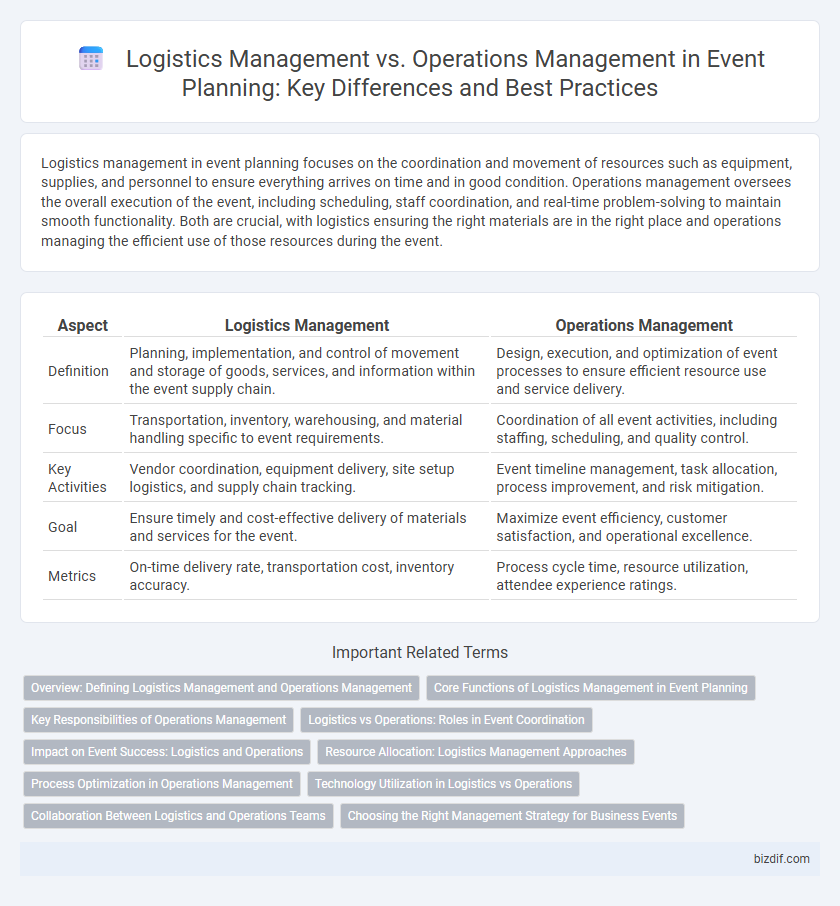Logistics management in event planning focuses on the coordination and movement of resources such as equipment, supplies, and personnel to ensure everything arrives on time and in good condition. Operations management oversees the overall execution of the event, including scheduling, staff coordination, and real-time problem-solving to maintain smooth functionality. Both are crucial, with logistics ensuring the right materials are in the right place and operations managing the efficient use of those resources during the event.
Table of Comparison
| Aspect | Logistics Management | Operations Management |
|---|---|---|
| Definition | Planning, implementation, and control of movement and storage of goods, services, and information within the event supply chain. | Design, execution, and optimization of event processes to ensure efficient resource use and service delivery. |
| Focus | Transportation, inventory, warehousing, and material handling specific to event requirements. | Coordination of all event activities, including staffing, scheduling, and quality control. |
| Key Activities | Vendor coordination, equipment delivery, site setup logistics, and supply chain tracking. | Event timeline management, task allocation, process improvement, and risk mitigation. |
| Goal | Ensure timely and cost-effective delivery of materials and services for the event. | Maximize event efficiency, customer satisfaction, and operational excellence. |
| Metrics | On-time delivery rate, transportation cost, inventory accuracy. | Process cycle time, resource utilization, attendee experience ratings. |
Overview: Defining Logistics Management and Operations Management
Logistics management in event planning involves coordinating the transportation, storage, and distribution of resources to ensure timely delivery of materials and equipment. Operations management focuses on overseeing the entire event process, including scheduling, staffing, and quality control to optimize performance and attendee experience. Both disciplines are critical to executing seamless events, with logistics ensuring physical flow and operations managing overall event execution.
Core Functions of Logistics Management in Event Planning
Logistics management in event planning focuses on coordinating the transportation, warehousing, and inventory control of materials and equipment to ensure timely availability and proper allocation. Key functions include route optimization, supplier coordination, and real-time tracking to minimize delays and reduce costs. These core activities enhance operational efficiency, enabling seamless event execution and improved attendee experience.
Key Responsibilities of Operations Management
Operations management in event planning centers on coordinating core activities such as venue setup, staff scheduling, and resource allocation to ensure seamless event execution. It involves overseeing equipment availability, managing onsite services like catering and security, and maintaining quality control throughout the event. Efficient operations management reduces risks, optimizes workflows, and enhances guest experience by aligning all event components with strategic objectives.
Logistics vs Operations: Roles in Event Coordination
Logistics management in event coordination focuses on the planning, implementation, and control of the movement and storage of goods, services, and information from suppliers to event sites, ensuring materials and equipment arrive on time. Operations management oversees the overall execution of the event, coordinating resources, staff, and processes to deliver a seamless attendee experience. Both roles are essential; logistics ensures physical readiness, while operations maintain efficient workflows and quality control during the event.
Impact on Event Success: Logistics and Operations
Logistics management ensures timely delivery and coordination of resources, directly impacting event setup and attendee experience by minimizing delays and disruptions. Operations management oversees the execution of event activities, including staff allocation and process optimization, which enhances overall efficiency and stakeholder satisfaction. Efficient integration of both logistics and operations management drives seamless event flow, reducing risks and maximizing success outcomes.
Resource Allocation: Logistics Management Approaches
Resource allocation in logistics management emphasizes the efficient distribution of materials, equipment, and personnel to ensure timely event execution. It involves detailed scheduling, inventory control, and transportation coordination to optimize the use of available resources. Effective logistics approaches minimize delays and reduce costs by aligning resource deployment closely with event timelines and venue requirements.
Process Optimization in Operations Management
Operations management in event planning emphasizes process optimization by streamlining workflows, resource allocation, and real-time problem-solving to enhance efficiency and reduce costs. Logistics management focuses on the coordination and movement of materials, equipment, and personnel to ensure timely setup and execution. Optimizing operational processes leads to improved event quality, minimized delays, and increased client satisfaction through systematic planning and continuous improvement.
Technology Utilization in Logistics vs Operations
Technology utilization in logistics management for event planning centers on real-time tracking systems, automated inventory management, and route optimization software, ensuring efficient transportation and timely delivery of materials. Operations management employs integrated event management platforms and communication tools to streamline scheduling, resource allocation, and on-site coordination, enhancing overall event execution. Both domains leverage technology but logistics prioritizes supply chain efficiency, while operations focus on seamless event workflows and guest experience optimization.
Collaboration Between Logistics and Operations Teams
Effective collaboration between logistics and operations teams in event planning ensures seamless coordination of resources, timely delivery of materials, and efficient setup processes. Integrating real-time communication tools and shared project management platforms enhances alignment, reduces delays, and minimizes operational risks. Optimizing this teamwork streamlines vendor management, improves attendee experience, and supports successful event execution.
Choosing the Right Management Strategy for Business Events
Logistics management in business events focuses on coordinating tangible resources such as venue setup, transportation, and equipment, ensuring timely delivery and efficient use. Operations management oversees broader processes including staff coordination, event flow, and service delivery to optimize overall attendee experience and operational efficiency. Selecting the right strategy depends on event scale, complexity, and specific goals, balancing detailed logistical coordination with seamless operational execution.
Logistics management vs operations management Infographic

 bizdif.com
bizdif.com